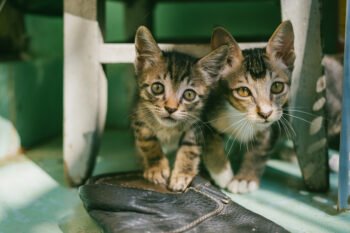Your cat is a precious member of the family who counts on you for her emotional well-being as well as for her health and safety. Because cats share our homes, it may be hard to see, at first, what might be unsafe for kitty. However, a close examination of your home — from your cat’s perspective — can reveal hidden dangers for your cat.
Avoid string, ribbon and other rope-like toys, which, if ingested, can cause life-threatening intestinal obstruction.
If your cat is fond of drinking from the toilet (a popular source of fresh water, believe it or not!), do not use toxic chemical cleaners or toilet tank drop-ins. Better still, keep the lid down on the toilet so kitty can’t fall in.
Train your cat never to dash out the door unexpectedly. Such escapes often lead to loss and injury, including car accidents.
Cats lack our sense of height and depth. If you live in a high-rise building or if your cat has access to upper story windows and decks, use screens and safely spaced bars to prevent jumping or accidental falls.
Remove or secure household toxins, including toxic plants, chemical cleaners and environmental insecticides. Whenever possible, consider using safer, alternative, “green” products.
Do not use dog-approved insecticides (such as organophosphate collars or dips) on your cat. Always follow label directions exactly; cats are extremely susceptible to toxins.
Never use anticoagulant or other rodent poisons in your home. These can be fatal to your cat if she hunts and ingests mice and other prey.
Even indoor environments can reach temperature extremes. Be sure your cat has access to cool or warm areas, as needed.
If there is any risk of accidental escape, keep a collar and identification tag on your cat at all times.
Obtain pet safety stickers from your local fire department to help firefighters identify the presence and location of pets in case of fire. Make sure to write your cat’s likely hiding places right on the sticker.
Do not leave your cat alone with electrical equipment, such as portable heaters, irons and fans, which can be accidentally knocked over.
Block or secure small openings such as air vents and loose ceiling tiles to prevent accidental entrapment.







